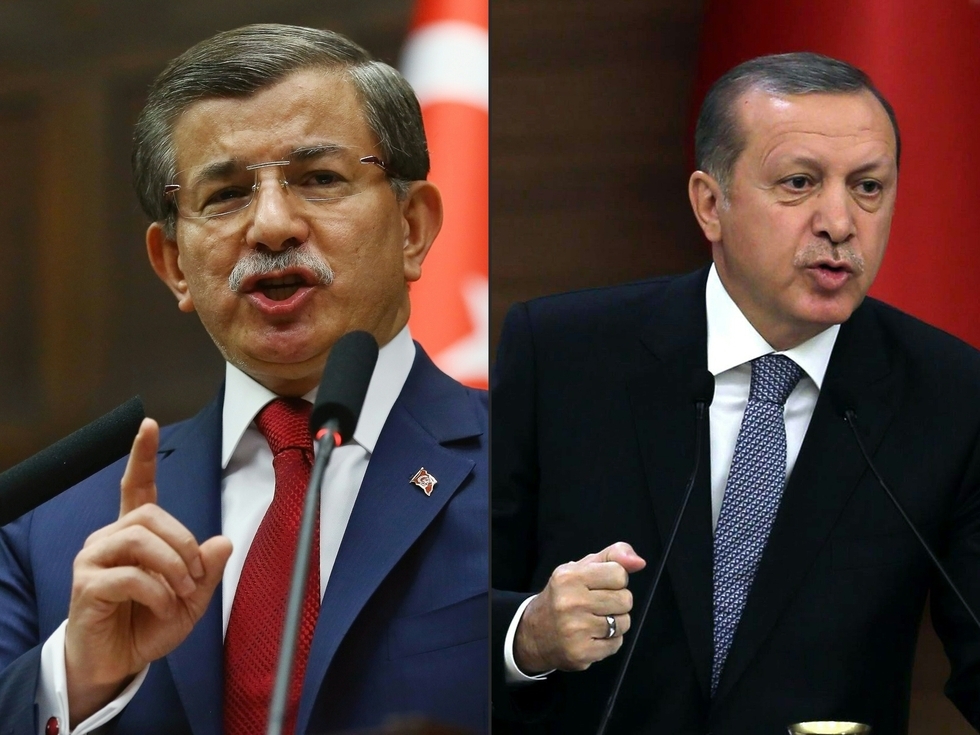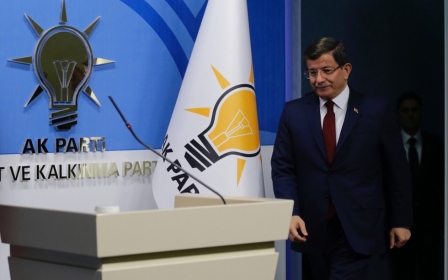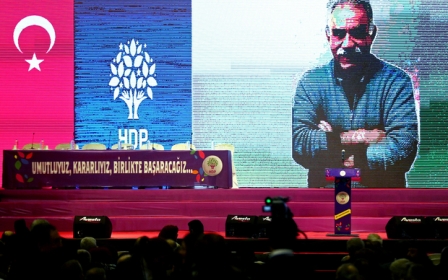Is Turkey's ruling party really crumbling?

The international media has been rife with various stories about a large schism forming between Turkey’s President Recep Tayyip Erdogan and his prime minister and Justice and Development Party (AKP) head, Ahmet Davutoglu. This comes after sudden news that Davutoglu will be resigning his post as prime minister and will also not seek to contest leadership of the AKP during the extraordinary congress called by the party to elect its new leader on 22 May.
Davutoglu has long been a central figure and pillar of the AKP machine, but will his departure from high office herald the beginning of the end for AKP? Not likely.
It is no secret that Erdogan will not tolerate anyone not toeing the party line, adhering to the overall strategic vision of the party under his leadership, and any deviation from AKP’s ordinarily tight discipline. One need only look to former president Abdullah Gul who, after seeming to oppose Erdogan’s methods and approach publicly, was put out to pasture and was pretty much never heard from again, his political career quietly snuffed out.
In that sense, Erdogan may no longer be party leader, as the president should be non-partisan, but through his sheer level of influence and the respect he commands from AKP members, he is still most certainly the party whip.
The nature of the issues between the two men is not precisely known. However, various outlets have reported that Erdogan was not particularly keen on the recent Turkish deal with the EU, allowing refugees who had reached the EU to be sent back in exchange for those in Turkey. It is not clear why Erdogan may or may not have opposed this deal, and there was no public spat between the two, so things remain vague as usual.
Further issues seem to stem from Erdogan’s vocal interjections when combating what he deems to be rogue elements in the press and academia. Again, it is unclear as to whether Davutoglu disagreed with him on the point or on the execution, although it would be reasonable to suggest it was the latter.
Erdogan is a very public, outgoing and charismatic man who clearly wants Turkey to transition to a presidential system sooner rather than later. He was never going to accept the non-partisan and ceremonial role that his office since 2014 has assigned him, and that much should have been obvious to everyone, and likely was to the outgoing prime minister.
However, Davutoglu still saw himself as having a more pro-active role to play rather than merely being a figurehead, and would have definitely been disturbed by Erdogan’s very public and forceful way of interfering in issues the prime minister should by rights deal with. It now seems nigh on certain that Davutoglu voiced these concerns to Erdogan on one too many occasions, leading to his fall from grace.
Long nicknamed the Hoca, or "teacher" in Turkish, Davutoglu had come to be respected as the brain behind Turkey’s diplomatic efforts that helped the country to secure numerous trade and energy deals with countries around the world, including Turkey’s admission to the G20 and its increasing clout in other international forums.
Davutoglu probably expected that when he transitioned from his role as chief diplomat to chief executive he would be afforded the same deal of trust as he had in his previous position. Plainly, this did not materialise to the degree he had hoped, and after these differences had surfaced between the two men, the AKP (probably with Erdogan’s blessing) voted to clip Davutoglu’s wings last week by stripping him of the right to appoint provincial party officials. This happened as Davutoglu was away on a state visit to Qatar.
But here is the thing that everybody should understand – there was no palace coup, as that palace was always Erdogan’s to begin with. Some, like the BBC, have stated that Erdogan’s actions are fuelled by his desire to “significantly increase his powers” as president because “under a parliamentary system…his role should be largely ceremonial”. All true, but sorely lacking in context. If all Erdogan cared about was executive power, then there was nothing stopping him from remaining in his position as prime minister. Erdogan is not solely after expanding his power just for the sake of it, but he is singularly determined to reshape the Turkish Republic by changing its constitution, its system and method of government and overhauling the state in general to what he believes would advance Turkey’s position in the world.
Of course, that would invariably mean his own position and prestige would advance, but for pundits and so-called experts to dilute his decades in politics to a singular ambition to be more powerful irrespective of his personal beliefs, is to miss the fact that he could have joined more “popular” political streams such as the Kemalist Republican People’s Party (CHP). Had Erdogan been that cynical and pragmatic, he would not have joined with Necmettin Erbakan, Turkey’s most prolific Islamist leader, and then suffered imprisonment for his political beliefs. To lay all of Erdogan’s actions, whether agreeable or not, on the door of seeking power is to ignore his political activism and history just for the sake of finding a reason to attack him.
What is also important is the way in which Davutoglu departed. Whilst he has stated in his resignation speech that leaving was not his choice, suggesting it was imposed upon him, he also made it clear that Erdogan’s “honour is my honour”. Yeni Safak also reported that he said that he would be willing to “leave any position instead of breaking [the] heart of any friend of mine or damaging…the process and principles of the party."
As such, it is obvious that Davutoglu understands that at the end of the day the goals of the two men are the same, but their methods differ and the circumstances will not allow for two men at the top of the power pyramid. He also knows that, as Erdogan is and has always been in overall control, nothing will change on the ground as players are substituted.
Erdogan has often said, in reference to the UN Security Council, that “the world is bigger than five”. That may be true, but Turkey is only big enough for one, and that one is Recep Tayyip Erdogan.
- Tallha Abdulrazaq is a researcher at the University of Exeter's Strategy & Security Institute, and winner of the Al Jazeera Young Researcher Award. He blogs at thewarjournal.co.uk and tweets from @thewarjournal
The views expressed in this article belong to the author and do not necessarily reflect the editorial policy of Middle East Eye.
Photo: This combination of file pictures of (L) Turkish Prime Minister Ahmet Davutoglu and (R) Turkish President Recep Tayyip (AFP).
New MEE newsletter: Jerusalem Dispatch
Sign up to get the latest insights and analysis on Israel-Palestine, alongside Turkey Unpacked and other MEE newsletters
Middle East Eye delivers independent and unrivalled coverage and analysis of the Middle East, North Africa and beyond. To learn more about republishing this content and the associated fees, please fill out this form. More about MEE can be found here.





